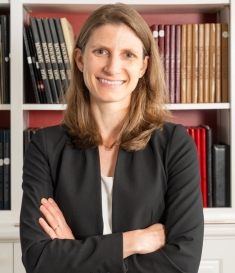This academic year, the law school is launching two new legal clinics. These reflect our continued commitment to experiential learning and public service. Through these clinics, students will collaborate with professionals across disciplines, engage in real-world legal challenges, and make a meaningful impact in across New Jersey.

Launched in fall 2025, the Rutgers Criminal Defense & Advocacy Clinic (CDAC) provides free, high-quality, zealous advocacy to clients ensnared in the criminal legal system. The primary focus of CDAC’s work is defending clients charged with crimes in Camden County municipal courts.
Working in teams of two, CDAC’s student attorneys are responsible for every stage of litigation in their cases. The students’ case work is complemented by a bi-weekly seminar in which the students learn lawyering, trial advocacy, professional responsibility, and professionalism skills through traditional seminar discussions, role playing, and simulation exercises. The seminar critically examines the history of the criminal legal system, helps students situate their case work within that history, and invites students to think creatively about opportunities for reform. A key feature of the seminar is the regular use of “case rounds,” a pedagogical tool designed to teach students how to identify problems they are experiencing in their cases, engage in group problem solving, and find common threads within their work.
As an in-house legal clinic, CDAC’s cases are handled by third-year law students who practice under the careful supervision of CDAC’s director and longtime defense attorney, Assistant Professor Jessica Frisina. Professor Frisina brings a decade of experience in criminal defense to her role as the Clinic’s director. Prior to joining the Rutgers faculty, Professor Frisina served as an Assistant Deputy Public Defender at the New Jersey Office of the Public Defender (NJOPD) for eight years. At NJOPD, she handled a full felony case load, gaining expertise in pretrial litigation and trial practice. Before joining NJOPD, Professor Frisina completed a two-year Equal Justice Works fellowship at the Michigan Children’s Law Center (MCLC) in Detroit. There, she served as a youth defender and launched an Education Advocacy Unit to disrupt the school-prison nexus ensnaring MCLC's clients. Professor Frisina is a graduate of Harvard Law School and Harvard College, where she studied civil rights and American social movements. Drawing on her years of experience in indigent defense, her research and writing center on police-citizen encounters, theories of punishment, and the ethics of criminal practice.
The new Ruth Bader Ginsburg Women’s Rights and Gender Justice Clinic (RBG Clinic) brings an intentional gender justice lens back to Rutgers’ powerful legacy of public interest lawyering. Inspired by Justice Ginsburg’s visionary leadership, the Clinic builds on her innovative, strategic use of litigation, legislation, education, and other forms of advocacy to advance women’s rights and dismantle systemic sex-based discrimination. It carries forward her integrated approach by offering law students a dynamic, hands-on opportunity to engage in real-world advocacy at the intersection of direct client representation, community collaboration, and the reflective study of lawyering.
The RBG Clinic revives and expands the former Women’s Rights Litigation Clinic in Newark, which was founded by Justice Ginsburg in the early 1970s and remained active until the early 2000s. The new Clinic is made possible by a $6.5 million gift from the Stephanie and Harold Krieger Charitable Trust, one of the largest gifts in the law school’s history.
Clinic students will gain practical experience working directly with individual and group clients, developing legal and policy strategies, and partnering with communities and coalitions to drive systemic reform. The Clinic’s pedagogical design incorporates a broad range of advocacy methods while emphasizing ethical and social dimensions of advocacy, including intersectional analysis, self-care, and trauma-informed lawyering practices.
Professor Marcy L. Karin, the Clinic’s founding director, brings a justice-driven, collaborative and interdisciplinary approach to legal education. She is deeply committed to training future gender justice advocates to lead with empathy, strategic insight, and a commitment to empowering clients, communities, and each other. Her work aims to use law to destigmatize “private” topics, combat structural harms, and advance needed changes for women, LGBTQ+ individuals, and families impacted by sexism, ableism, racism, poverty, gender-based violence, and inequitable access to economic security, education, healthcare, and other civil rights.
She joined Rutgers Law in the fall of 2025. Professor Karin was the 2023 Fulbright-Scotland Distinguished Scholar and previously taught at the University of the District of Columbia David A. Clarke School of Law, the Arizona State University Sandra Day O’Connor College of Law, and Georgetown University Law Center.
One of the goals of the Rutgers Law Strategic Plan is to deepen our connections with our communities through our clinical programs. Our strategy is to create more clinical offerings for students by expanding opportunities in existing clinics and developing new clinics as needed. Click here to learn more about our Strategic Plan.